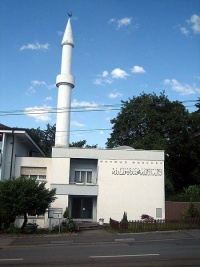Swiss Minaret Construction Ban, 2009
A measure designed to ban minarets on mosques was on the ballot in Switzerland on November 29, 2009. The measure was approved with 57.5 percent of voters in favor of prohibiting future additions of minarets on mosques in Switzerland. Approximately 53 percent of eligible voters cast ballots in the election.[1]
Aftermath
Following the vote, the Swiss government stated that it would not oppose the decision by the majority of voters. The government also issued a statement saying that the nation was not in opposition to Muslim people, religion or culture. The statement affirmed that Muslims in Switzerland were free to practice their religion at their mosques or in their homes.
Spokespeople from the Muslim community said they believed the vote revealed Swiss racism, and Catholic bishops in Switzerland said that the vote would make it more difficult to build coalitions between the Islamic and Christian religions. The Swiss foreign minister said that the group advocating for the ban played on voters' fears.[2]
Amnesty International stated that the measure violated Muslims' freedom of religion guaranteed in the Swiss constitution and international treaties signed by the country.[3]
Some Swiss leaders expressed fear that anti-Islamic sentiments would increase across the European continent following the election.[4]
Following the approval of the minaret ban, the Swiss People's Party expressed intent to pursue bans on forced marriages and on burqas in public areas.[1]
The Council of Europe urged the Swiss government to repeal the vote, stating that the measure was a violation of human rights and discriminatory toward the Muslim community. The council also stated in the same resolution that any move by governments to ban burqas would be a violation of Muslim women's rights.[5] The Turkish Prime Minister proposed a boycott on Swiss banks to protest the ban on December 1, 2009.[4][6]
Support
The Swiss People's Party petitioned and campaigned in favor of the ban on minarets, collecting approximately 130,000 signatures to place the referendum on the ballot.[7] In their campaign, party spokespeople stated that they believed minarets were a political symbol and that banning minarets would push back against what they called a Muslim goal to "Islamicize" Switzerland and other countries. Proponents also argued that Muslim influence could lead to the implementation of Sharia law in place of Swiss law.[7][3]
The Federal Democratic Union also supported the ban, as did feminists Ayaan Hirsi Ali and Julia Onken. Some feminists said that minarets were a political symbol of male domination over women.[8][9]
Opponents
Leading up to the election, the Imam of the mosque in Zurich stated that the measure was political and in opposition to the Muslim people. He argued that approval of the measure would promote radicalism, and increase isolation and poor treatment toward younger generations.[7]
The leader of the Cultural Association of Muslim Women in Switzerland stated that the ban on minarets was viewed as an expression of hostility toward the nation's Muslim population and a sign that other cultures were not welcome in Switzerland. Muslims accounted for 5 percent of the country's population at the time of the election, with the majority of Muslim immigrants migrating from Turkey, Albania, and Bosnia.[10]
The U.N. Human Rights Committee voiced opposition to campaign posters used by the Swiss Peoples Party, stating that they were discriminatory and that the ban would be in violation of international law. The government of Switzerland spoke out against the referendum as well, stating that people should vote for political and religious freedom in the country. The foreign minister stated that approval would create a security risk for the country.[9]
The UN High Commissioner for Human Rights, Navi Pillay, stated after the election that the vote was discriminatory and condemned what she called anti-immigration scare tactics.[4]
A coalition of groups from the Muslim, Catholic, and Jewish communities, and the business lobby Economiesuisse also opposed the measure. Other opponents included Maskuri Abdillah, leader of Indonesia's largest Muslim group at the time, Egyptian interpreter of Islamic law Mufti Ali Gomaa, British Muslim youth organizer Mohammed Shafiq and a Vatican spokesperson.[11][12]
See also
Footnotes
- ↑ 1.0 1.1 The Wall Street Journal, "Swiss Ban Minarets in Controversial Vote," accessed November 30, 2009
- ↑ Deutsche Welle, "Swiss vote to ban construction of minarets," accessed November 29, 2009
- ↑ 3.0 3.1 The Australian, "Surprise Swiss vote to ban minarets," accessed November 30, 2009
- ↑ 4.0 4.1 4.2 AFP, "Fears grow over dangers of Swiss minaret vote," accessed December 1, 2009
- ↑ Europe World News, "Council of Europe urges Switzerland to lift minaret ban," accessed June 23, 2010
- ↑ Deutsche Welle, "Turkish minister calls on Muslims to boycott Swiss banks," accessed December 2, 2009
- ↑ 7.0 7.1 7.2 PM, "The Swiss to vote on ban of minarets on mosques," accessed November 27, 2009
- ↑ Times Online, "Women lead Swiss in vote to ban minarets," accessed November 29, 2009
- ↑ 9.0 9.1 Cite error: Invalid
<ref>tag; no text was provided for refs namedap - ↑ The Independent, "Minaret poll casts a dark shadow over Switzerland," accessed November 28, 2009
- ↑ RTE News, "Minaret referendum causes concern in Switzerland," November 27, 2009
- ↑ Independent, "Vatican joins Muslim world to condemn Swiss minaret ban," accessed December 1, 2009
| |||||||||||||||||||




